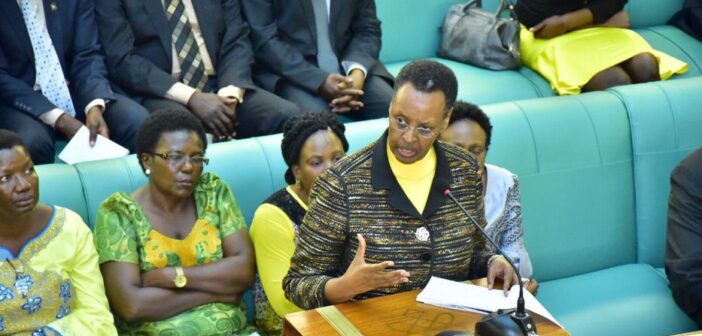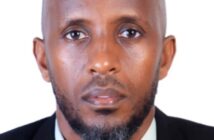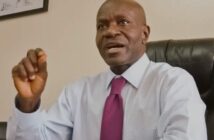Parliament has halted the implementation of the revised lower secondary curriculum, which among others scrapped termly examinations.
The decision followed an extensive debate on the ministerial statement presented by the state minister for Primary Education, Rosemary Sseninde on the matter during plenary on Tuesday.Last week, the deputy speaker of parliament, Jacob Oulanyah directed the Education minister to address parliament on the implementation of the new curriculum scheduled to start this term. The curriculum was developed by the National Curriculum Development Centre (NCDC).
The new curriculum replaces termly exams with projects that students will undertake at every end of the topic. Teachers will then be required to note the student’s progress before any a new topic is introduced. However, teachers will be administering end of year exams in order to give feedback to parents and guardians.
Prior to the presentation of the statement, on Monday a group of legislators called on government to halt the implementation of the new curriculum on grounds that some vital subjects had been made optional and that there were not sufficient consultations.
However, on Tuesday, Sseninde insisted that government will not halt the implementation of the new curriculum, saying it will be applied to senior one students. She tabled sample books of the revised curriculum before parliament chaired by the speaker, Rebecca Kadaga.
“As government we’re not halting the implementation of the lower secondary curriculum. I wish to emphasize it is starting now with senior one February 2020. Madam speaker at this moment, allow me to lay on table the box that has the teacher support manuals, guides and also the subject textbooks. And this is just as a sample for members to just be assured that the books are in place.” said Sseninde.She asked parliament to supports the ministry of Education to implement the new curriculum so that it improves the country’s education and improve what children learn.
“This is to kindly request your office madam speaker to organize a one-day workshop where the ministry of Education and Sports can sensitize members on the new lower secondary curriculum to enable them respond to their constituents with authority. In case you want to get more information, we have informed madam speaker but in case they want more information to ask because they have to be an authority when they are talking on radio or when they are informing their members.” said Sseninde.
“Because madam speaker it is so shameful for a member of parliament to be asked and you cannot be in position to respond or to respond correctly. I would also like to request for support of the House, we’re requesting you members of parliament to support us in this because improving the quality of education in Uganda is not a sole responsibility of ministry of Education. It is our share role so I am calling upon your support.” she added.
According to Sseninde, the current curriculum was designed in the 1960s mainly to produce human resource for white-collar jobs. She however said government has a different development agenda to address the country’s transformation.“We note that lower secondary level is still basic education. Learners are exposed to a variety of subjects to widen their scope of thinking and enable their intellectual ability to grow. The cognitive growth is enhanced through exposure among other things. At this level, we are not yet going into career paths but exposed to what one can pick interest in or is about to do. The curriculum is competence based aimed at exposing the learners to issues of creativity and innovativeness and emphasizes values which have been a challenge,” reads part of Sseninde’s statement.
She said that major changes in the curriculum are the methodologies, emphasis on values, assessment modalities, reduction on instruction time from 8:30 am to 2:55 pm and compulsory teaching of Kiswahili among other things.
“The materials have all been developed including the senior one textbook which is being used to kick start the implementation of the lower secondary curriculum. The distribution is ongoing in preparation for the senior one who are reporting on 17th February 2020. The process for procurement of textbooks from publishers is on-going and the books for senior one and two are expected to be supplied in July,” said Sseninde.
Parliament also learnt that private school teachers have been included in the curriculum review process and that some of their staff participated in its development.
“Some of them have been trained as master trainers and they are now participating in the training of the 20,000 teachers nationwide. Government has issued all syllabus books to private schools free of charge, they have also been supplied with the necessary instructional materials,” she explained.
Her submission generated a heated debate that lasted for over 5 hours with several legislators cautioning government against rushing the implementation of the new curriculum without the required human resource and providing adequate time for the transition.
The shadow Education minister, Mathias Mpuuga, said what government developed cannot pass for curriculum reforms but a small adjustment in the curriculum. He maintained that government wasn’t ready to implement the curriculum, saying it should be rolled back.
“Just before this statement and policy attendant to it, the ministry of Education communicated a few months back in December that there is a policy adjustment. There is no more funding of USE in private secondary schools and before the dust settles this is thrown in our faces. This is what they call chaotic planning madam speaker.” Mpuuga said.
“This is chaos, first of all, you have implemented a change that access through USE has been limited to strictly government secondary schools. The initial policy was that for every sub-county to there should be a secondary school. Those are not there and before you put them there you’re making a very serious reform to the effect that you can only fund children through government schools and then a spanner in the works.”He wondered why the Education ministry was in panic, saying that one cannot talk about a change in assessment without taking time to develop assessment tools and adequately prepare the trainers how to do so.
“How are you going to assess madam minister? This is called organized chaos. You can’t. Assessment as a key component in education is a whole different aspect and it needs time. Madam speaker the supervisors of our education are headteachers, private and government are completely green about this.
The ministry if huffing and puffing to train some teachers in those thematic schools but their supervisors are green. So what do you expect the head teachers to do, sit and look on in admiration, in fear as their juniors come to cause further organized chaos in schools they are supposed to be retained over and report. Hon minister with due respect, I don’t think you’re ready unless you’re not discussing education. But if you’re discussing education, you need to roll back this policy.”
Kira Municipality MP, Ibrahim Ssemujju Nganda said that the new curriculum has caused confusion in schools.
“I went to Kibuli [secondary school]where my son is a student, the teachers who are going to undertake this new curriculum are actually fidgeting going through training that is why you have postponed the term for these schools, they are confused. I was in schools in Kampala, same schools visiting others to find out how this will work but where they are visiting they are telling them, even us we don’t know. So this particular statement of the minister madam speaker is full of inaccuracies, full of lies [and]the truth of the matter you have caused a stampede in secondary schools. If you don’t know then maybe you don’t live in Uganda.”The Igara East MP, Michael Mawanda questioned why government was not giving time to schools to understand the new curriculum before rushing its implementation. The speaker also questioned whether teachers upcountry were being trained.
The Budadiri West MP Nathan Nandala Mafabi moved a motion for the suspension of the implementation of the new curriculum implementation until MPs are satisfied with it and adequate consultations are made with all stakeholders.
He was seconded by the Kasilo County MP, Okupa Elijah and Kiboga East MP, Keffa Kiwanuka. MPs unanimously voted suspending the curriculum implementation when the speaker put the matter to a vote. urn
Post Views: 990



